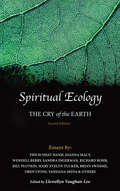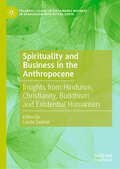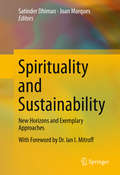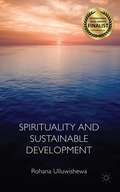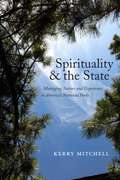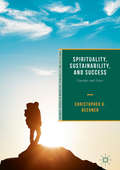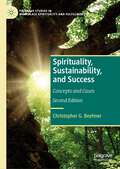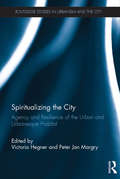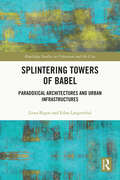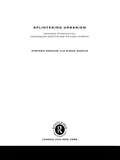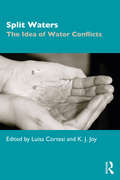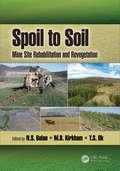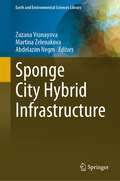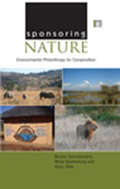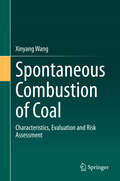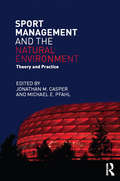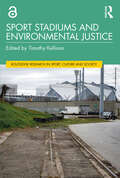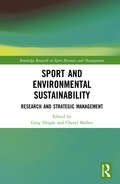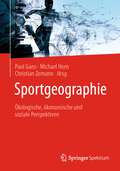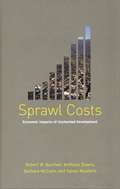- Table View
- List View
Spiritual Ecology: The Cry of the Earth
by Thich Nhat Hanh Wendell Berry Vandana Shiva Llewellyn Vaughan-Lee Sandra Ingerman Joanna Macy Mary Evelyn Tucker Brian Swimme Bill Plotkin Father Richard RohrThe first edition of this book fostered the emergence of the "Spiritual Ecology Movement," which recognizes the need for a spiritual response to our present ecological crisis. It drew an overwhelmingly positive response from readers, many of whom are asking the simple question, "What can I do?" This second expanded edition offers new chapters, including two from younger authors who are putting the principles of spiritual ecology into action, working with their hands as well as their hearts. It also includes a new preface and revised chapter by Llewellyn Vaughan-Lee, that reference two major recent events: the publication of Pope Francis's encyclical, "On Care for Our Common Home," which brought into the mainstream the idea that "the ecological crisis is essentially a spiritual problem"; and the 2015 Paris Climate Change Conference, which saw representatives from nearly 200 countries come together to address global warming, including faith leaders from many traditions. Bringing together voices from Buddhism, Sufism, Christianity, and Native American traditions, as well as from physics, deep psychology, and other environmental disciplines, this book calls on us to reassess our underlying attitudes and beliefs about the Earth and wake up to our spiritual as well as physical responsibilities toward the planet.
Spirituality and Business in the Anthropocene: Insights from Hinduism, Christianity, Buddhism and Existential Humanism (Palgrave Studies in Sustainable Business In Association with Future Earth)
by Laszlo ZsolnaiThis contributed volume collects innovative papers by scholars from Europe, India, and the USA to investigate how spirituality can contribute to renewing business in response to the challenges of the Anthropocene era. These challenges include climate change, biodiversity loss, ecosystems collapse, growing inequality, wellbeing deficiencies, and social unrest. Using insights from Christianity, Hinduism, Buddhism, and Existential Humanism the book explores the spiritual aspects of the present ecological, economic, social and ethical crises, materialist worldviews in the Anthropocene and their relation to crises. Further, it reinterprets personalism for embracing ecological values, presents working models of spiritually-based sustainability practices in business, and discusses the integration of spirituality into business education to foster a greater understanding of our interconnectedness with the planet and with each other. Part of the Palgrave Studies in Sustainable Business in Association with Future Earth book series, this interdisciplinary work will be of great interest to scholars and students of sustainability, spirituality in business, leadership, and many other fields.
Spirituality and Sustainability
by Satinder Dhiman Joan MarquesThis book aims to examine sustainability and spirituality philosophically with ethics as the balancing force. The goal is to reveal the important intersection between sustainability and spirituality by using spirituality as the invisible guiding hand in the quest for sustainability. The editors and contributors examine old social and economics dilemmas from a new perspective in order to provide alternative approaches to economic and social development. The enclosed contributions cover a broad range of topics such as sustainable development and human happiness, contemporary spirituality, environmental ethics and responsibility, and corporate social responsibility. In addition, the title features real-world case studies and discussion questions that inspire self-reflection and theoretical and empirical deliberation in academic courses and business seminars. Contemporary approaches to economic and social development have failed to address humankind's abiding need for spiritual growth. For material development to be sustainable, spiritual advancement must be seen as an integral part of the human development algorithm. While the policy makers and governments can play their respective role, each one of us has to consciously adopt spirituality and sustainability as a way of life. This book will rely on the spiritual power of individuals to heal themselves and the environment. Featuring interdisciplinary perspectives in areas such as science, marine biology, environmental policy, cultural studies, psychology, philosophy, ecological economics, and ethics, this book will provide extensive insights into the complimentary fields of spirituality, sustainability and ethics.
Spirituality and Sustainable Development
by Rohana UlluwishewaLooking beyond the materialistic boundary of the conventional development paradigm, this book identifies our spiritual underdevelopment which is being reflected as self-centeredness and greed, as the root cause of conventional development's failure to alleviate poverty and inequality, achieve sustainability and deliver happiness to humanity.
Spirituality and the State: Managing Nature and Experience in America's National Parks (North American Religions)
by Kerry MitchellAn exploration of the production and reception of nature and spirituality in America’s national park systemAmerica’s national parks are some of the most powerful, beautiful, and inspiring spots on the earth. They are often considered “spiritual” places in which one can connect to oneself and to nature. But it takes a lot of work to make nature appear natural. To maintain the apparently pristine landscapes of our parks, the National Park Service must engage in traffic management, landscape design, crowd-diffusing techniques, viewpoint construction, behavioral management, and more—and to preserve the “spiritual” experience of the park, they have to keep this labor invisible.Spirituality and the State analyzes the way that the state manages spirituality in the parks through subtle, sophisticated, unspoken, and powerful techniques. Following the demands of a secular ethos, park officials have developed strategies that slide under the church/state barrier to facilitate deep connections between visitors and the space, connections that visitors often express as spiritual. Through indirect communication, the design of trails, roads, and vista points, and the management of land, bodies and sense perception, the state invests visitors in a certain way of experiencing reality that is perceived as natural, individual, and authentic. This construction of experience naturalizes the exercise of authority and the historical, social, and political interests that lie behind it. In this way a personal, individual, nature spirituality becomes a public religion of a particularly liberal stripe. Drawing on surveys and interviews with visitors and rangers as well as analyses of park spaces, Spirituality and the State investigates the production and reception of nature and spirituality in America’s national park system.
Spirituality, Sustainability, and Success: Concepts and Cases (Palgrave Studies in Workplace Spirituality and Fulfillment)
by Christopher G. BeehnerThis book offers a pragmatic approach to the benefits of spirituality and sustainability for both individual and organizational success. It introduces sustainability and workplace spirituality as contemporary solutions to the challenging organizational environment. The first few chapters introduce the fundamentals of spirituality, workplace spirituality, and sustainability. The author then demonstrates how the three qualities are beneficial in achieving personal and business success. Through the combination of synthesized research summaries and case studies of individuals and organizations, this book offers readers a fresh perspective on the importance of spirituality and sustainability to organizational performance.
Spirituality, Sustainability, and Success: Concepts and Cases (Palgrave Studies in Workplace Spirituality and Fulfillment)
by Christopher G. BeehnerThis book offers a pragmatic approach to the benefits of spirituality and sustainability for both individual and organizational success. It introduces sustainability and workplace spirituality as contemporary solutions to the challenging organizational environment. The first few chapters introduce the fundamentals of spirituality, workplace spirituality, and sustainability. The author then demonstrates how the three qualities are beneficial in achieving personal and business success. Through the combination of synthesized research summaries and case studies of individuals and organizations, this book offers readers a fresh perspective on the importance of spirituality and sustainability to organizational performance.
Spiritualizing the City: Agency and Resilience of the Urban and Urbanesque Habitat (Routledge Studies in Urbanism and the City)
by Victoria Hegner Peter Jan MargryUrban spaces have always functioned as cradles and laboratories for religious movements and spiritualities. The urban forms a central and nourishing agent for the creation of new religious expressions, and continually negotiates new ways of being spiritual and establishing spiritual ideas and practices. This book explores the intense and complex interplay between the (post) modern city and new religious and spiritual movement, bringing the city and its annexes into the foreground of current research into religion. It develops a new, ethnography-based analysis of the ways in which the pluralist experience of the "urban" inscribes itself into various religious practices and vice versa: how do religiosity and spirituality appropriate and transform meanings of the urban? It focuses on new religious expressions, cosmologies and ways of life that go beyond established belief systems and religious understandings, and explores new conceptions of the word "urban" in a world of increasingly extended urban environments. The book examines how cities are both considered as sites and sources of spirituality, where the globalization of religions takes place as well as the fact that globalization is linked closely to the process of localization. The socio-cultural and political uniqueness of the specific urban context are analyzed to present an innovative perspective on how the interplay between the urban, spiritual and religious should be understood. This book brings a timely new perspective and will be of interest to academics and students in geography, sociology, urban studies, cultural studies and anthropology, as well as for urban planners and policy makers.
Splash and Bubbles: Penguins! (Splash and Bubbles)
by The Jim Henson CompanySplash, Bubbles, and friends introduce amazing ocean creatures in this photo-illustrated early reader based on Jim Henson&’s Splash and Bubbles. Learn all about penguins, from their habitats to their physical features to their behaviors, from the fish who know best: Splash, Bubbles, and friends! These science readers are packed with amazing facts, full-color photographs, and bright art from the PBS Kids series Splash and Bubbles. With a true-or-false activity and a glossary to reinforce the nonfiction content, these easy-to-read books are sure to appeal to emerging readers and animal enthusiasts! In the series of books based on the Jim Henson Company&’s Splash and Bubbles on PBS Kids, Splash, Bubbles, and their friends explore the world&’s undersea habitats, make new friends, and learn about the many different ways life looks and lives in the ocean, celebrating the importance of diversity along the way.
Splash and Bubbles: Sharks! (Splash and Bubbles)
by The Jim Henson CompanySplash, Bubbles, and friends introduce amazing ocean creatures in this photo-illustrated early reader based on Jim Henson&’s Splash and Bubbles. Learn all about sharks, from their habitats to their physical features to their behaviors, from the fish who know best: Splash, Bubbles, and friends! These science readers are packed with amazing facts, full-color photographs, and bright art from the PBS Kids series Splash and Bubbles. With a true-or-false activity and a glossary to reinforce the nonfiction content, these easy-to-read books are sure to appeal to emerging readers and animal enthusiasts! In the series of books based on the Jim Henson Company&’s Splash and Bubbles on PBS Kids, Splash, Bubbles, and their friends explore the world&’s undersea habitats, make new friends, and learn about the many different ways life looks and lives in the ocean, celebrating the importance of diversity along the way.
Splintering Towers of Babel: Paradoxical Architectures and Urban Infrastructures (Routledge Studies in Urbanism and the City)
by Liora Bigon Edna LangenthalSplintering Towers of Babel focuses on, and redefines, soft infrastructures and critical infrastructure projects. It explores key and issues in contemporary urban studies including town planning histories, architecture, heritage, colonialism and postcolonialism, philosophy and ethics. The book combines transdisciplinary perspectives on the key historical, philosophical, and political issues associated with urban experiences, built forms and infrastructure networks. It explores uneven dimensions in contemporary urbanisms and develops spatial phenomenological thinking with reference to the northern and southern hemispheres. This book connects the past and the present, in addition to Western and global South geographies, with a focus on Sub-Saharan Africa. Its main contribution is to broaden readers understanding of infrastructure through the lens of the humanities, and to engage with political, poetical, and ethical perspectives. This book is tailored to scholars working in the fields of urban planning, urban geography, architectural history, urban design, infrastructure studies, colonial and postcolonial studies, African studies, and philosophy.
Splintering Urbanism: Networked Infrastructures, Technological Mobilities and the Urban Condition
by Steve Graham Simon MarvinSplintering Urbanism makes an international and interdisciplinary analysis of the complex interactions between infrastructure networks and urban spaces. It delivers a new and powerful way of understanding contemporary urban change, bringing together discussions about:*globalization and the city*technology and society*urban space and urban networks*infrastructure and the built environment*developed, developing and post-communist worlds.With a range of case studies, illustrations and boxed examples, from New York to Jakarta, Johannesberg to Manila and Sao Paolo to Melbourne, Splintering Urbanism demonstrates the latest social, urban and technological theories, which give us an understanding of our contemporary metropolis.
Split Waters: The Idea of Water Conflicts
by K. J. Joy Luisa CortesiLimited, finite, contaminated, unavailable or expensive, water divides people all around the globe. We all cannot do without water for long, but can for long enough to fight for it. This commonsensical narration of water conflicts, however, follows a pattern of scarcity and necessity that is remarkably unvaried despite different social and geographical contexts. Through in-depth case studies from around the globe, this volume investigates this similarity of narration—confronting the power of a single story by taking it seriously instead of dismissing it. In so doing, it invites the reader to rethink water conflicts and how they are commonly understood and managed. This book: Posits the existence of the idea of water conflict, and asks what it is and what it produces, thus how it is used to pursue particular interests and to legitimise specific historical, technological and environmental relations; Examines the meaning and power of ideas as compared to other categories of knowledge, advancing theoretical frameworks related to environmental knowledge, discursive power, social constructivism; Presents an alternative agenda to deepen the conversation around water conflicts among scholars and activists. Of interest to scholars and activists alike, this volume is addressed to those involved with environmental conflicts, environmental knowledge and justice, disasters and climate change from the disciplinary angles of environmental anthropology and sociology, political ecology and economy, science and technology studies, human geography and environmental sciences, development and cooperation, public policy and peace studies. Essays by Gina Bloodworth, Ben Bowles, Patrick Bresnihan, Luisa Cortesi, Mattia Grandi, K. J. Joy, Midori Kawabe, Adrianne Kroepsch, Vera Lazzaretti, Leslie Mabon, Renata Moreno Quintero, Madhu Ramnath, Jayaprakash Rao Polsani, Dik Roth, Theresa Selfa,Veronica Strang, Mieke van Hemert, Jeroen Warner, Madelinde Winnubst.
Spoil to Soil: Mine Site Rehabilitation and Revegetation
by N. S. Bolan M. B. Kirkham Y. S. OkSpoil to Soil: Mine Site Rehabilitation and Revegetation presents both fundamental and practical aspects of remediation and revegetation of mine sites. Through three major themes, it examines characterization of mine site spoils; remediation of chemical, physical and biological constraints of mine site spoils, including post mine-site land-use practices; and revegetation of remediated mine site spoils. Each theme includes chapters featuring case studies involving mine sites around the world. The final section focuses specifically on case studies with successful mine site rehabilitation. The book provides a narrative of how inert spoil can be converted to live soil. Instructive illustrations show mine sites before and after rehabilitation. The purpose of this book is to provide students, scientists, and professional personnel in the mining industry sensible, science-based information needed to rehabilitate sustainably areas disturbed by mining activities. This book is suitable for undergraduate and graduate students majoring in environmental, earth, and soil sciences; environmental and soil scientists; and mine site environmental engineers and regulators.
Sponge City Hybrid Infrastructure (Earth and Environmental Sciences Library)
by Martina Zelenakova Abdelazim Negm Zuzana VranayovaThis book focuses on the access to water in the building and its surroundings, to infer the mutual interaction and the complex interconnection of green/blue infrastructures. This book is a tool for understanding the multifunctional functionality of urban waste water to recognize their efficient and strategically useful potential in the form of aesthetic and functional architectural elements—vertical gardens, waterproof roof systems, rain gardens, retention rainwater recirculation tanks, biomarkers for wastewater treatment, and other progressive technologies and technical solutions. The originality of the proposed book and the innovation of the proposed objectives lies in the complexity and interdisciplinary of the problem solved, with clear continuity and utilization in professional building, environmental, and psychosocial practice. Understanding the quality of life as a category influenced by several objective and subjective conditions, this manuscript draws up recommendations on how to build “green buildings”—progressively supplied with water, connecting infrastructures—from existing buildings (administrative or training).
Sponsoring Nature: Environmental Philanthropy for Conservation
by Maano Ramutsindela Harry Wels Marja SpierenburgSaving the world's flora and fauna, especially high-profile examples such as chimpanzees, whales and the tropical rain forests, is big business. Individuals and companies channel their resources to the preservation of nature through various ways, one of which is the funding of environmental non-governmental organizations (ENGOs) and community-based organizations (CBOs). This book is the first to comprehensively address this issue and focus on a dominant theme in environmental philanthropy, the links between ENGOs and CBOs and their sponsors, especially the private sector. It has been argued that donor support is based on recipient's perceived expertise and needs, with no favouritism of flagship environmental organizations as recipients of donor funds. A counterview holds that the private sector prefers to fund mainstream ENGOs for environmental research and policy reforms congenial to industrial capital. The authors show that the debate about these arguments, together with the empirical evidence on which they are based, may shed light on certain aspects of the nature of environmental philanthropy. The book evaluates practical examples of environmental philanthropy from Africa and elsewhere against philosophical questions about the material and geographical expressions of philanthropy, and the North-South connections among philanthropists and ENGOs and CBOs.
Spontaneous Combustion of Coal: Characteristics, Evaluation and Risk Assessment
by Xinyang WangThis book aims to understand, analyze and mitigate the harmful impacts of spontaneous coal combustion in underground mines, a thermal phenomenon that triggers fires and explosions threatening the safety of mine workers globally. Based on experimental and theoretical research findings, the book emphasizes three essential questions that are fundamental to understand spontaneous coal combustion: What are the root causes? How to evaluate the causative factors to determine the activity of coal? and How to bring this issue under control in real longwall panel? Readers are introduced to experimental techniques applied to investigate the basic molecular structure of coal and evaluate chemical properties that induce self-heating behavior, theoretical analyses to predict the extrinsic effect on low temperature oxidation of coal in experimental scale and full-size longwall panel, and preventive measures to mitigate this issue using methods for retardant screening, numerical simulations for optimal grouting and nitrogen injections, and case studies analyzing thermal events using mine atmosphere gas monitoring data. The book will be of interest to students and researchers studying mining engineering and chemistry, as well as engineers and practitioners involved in coal mine development and risk assessment.
Sport Management and the Natural Environment: Theory and Practice
by Jonathan M. Casper Michael E. PfahlWith climate change and other environmental issues becoming increasingly prominent, any successful sport organization now has to incorporate environmental concerns into their business strategy, while all sport managers must understand how to implement environmental initiatives into their everyday business. Sport Management and the Natural Environment is the first book to introduce environmental theory and best practice in the context of sport management, demonstrating how sport organizations can become more effective and sustainable, and exploring the important advocacy role that sport organizations have in local and global communities. It considers the unique social, economic and political space that sport occupies in society, and examines the most important practical managerial issues related to sport and the environment, including: Facilities Finance and accounting Leadership Marketing, communication and digital media Operations Stakeholder relations Strategic planning Including contributions from leading academics and practitioners, Sport Management and the Natural Environment is the perfect foundation text for any course touching on environmental issues or social responsibility in sport, and essential reading for any sport manager looking to improve their professional practice.
Sport Stadiums and Environmental Justice (Routledge Research in Sport, Culture and Society)
by Timothy KellisonThis book explores the local environmental impact of sports stadiums, and how that impact can disproportionately affect communities of color. Offering a series of review articles and global case studies, it illustrates what happens when sport organizations and other public and private stakeholders fail to factor environmental justice into their planning and operations processes. It opens with an historical account of environmental justice research and of research into sport and the natural environment. It then offers a series of case studies from around the world, including the United States, Canada, Kenya, South Africa, and Taiwan. These case studies are organized around key elements of environmental justice such as water and air pollution, displacement and gentrification, soil contamination, and transportation accessibility. They illustrate how major sports stadiums have contributed positively or negatively (or both) to the environmental health of the compact neighborhoods that surround them, to citizens’ quality of life, and in particular to communities that have historically been subjected to unjust and inequitable environmental policy. Placing the issue of environmental justice front and center leads to a more complete understanding of the relationship between stadiums, the natural environment, and urban communities. Presenting new research with important implications for practice, this book is vital reading for anybody working in sport management, venue management, mega-event planning, environmental studies, sociology, geography, and urban and regional planning.
Sport and Environmental Sustainability: Research and Strategic Management (Routledge Research in Sport Business and Management)
by Cheryl Mallen Greg DingleDrawing on recent work in sport studies, business and management, health, science, and law, this book offers a critical examination of the latest published research on sport and environmental sustainability. It examines how strategic management, policy and education influence the relationship between sport and the natural environment, and how the transmission and advancement of knowledge via research journals can, and should, have an impact on policy and practice. Covering sport at all levels, from professional to non-profit, and across all sectors of sport management, from marketing and events to facilities and communications, Sport and Environmental Sustainability makes a powerful argument for an awareness of, and need for, environmental sustainability in sport. Chapters outline the research and methods used, expose gaps in the literature and encourage opportunities for future inter-disciplinary research. Topics include sport and climate change, sport and safeguarding air and water quality, education for sustainability, and sport policy. This is an invaluable resource for researchers in sport and environmental sustainability, and academics working in sport management, business, recreation and leisure studies, and sustainability programs, as well as sport policymakers and industry practitioners.
Sport, Leisure and Culture in the Postmodern City (Heritage, Culture and Identity)
by Stephen WaggThe widespread concept of the 'postmodern city' is frequently linked to the decline of traditional manufacturing industries and a corresponding wane of white working-class culture. In place of these appear flexible working practices, a diversified workforce, and a greater emphasis on consumption, leisure, and tourism. Illustrated by an interdisciplinary study of Leeds, a typical postmodern city, this volume examines how such cities have reinvented themselves - commercially, politically and spatially - over the past two decades. The work addresses issues like cultural policy, city-centre development, sport, leisure and identity, and explores different urban processes in relation to changing configuration of class, gender and ethnicity in the postmodern city.
Sportgeographie: Ökologische, ökonomische und soziale Perspektiven
by Paul Gans Michael Horn Christian ZemannVom Lauf im Park bis zu Olympischen Spielen – Sport hat viele Facetten und die Wirkungen auf Umwelt, Wirtschaft und Gesellschaft sind immens. Sport braucht dabei immer Räume: Stadien, Sportplätze und Schwimmhallen, Berge und Wälder, Parks, Straßen oder Industriebrachen. Individualisierung und Lifestyle differenzieren den Sport mit neuen Anforderungen an die Nutzung des Raumes.Ökologisch wirkt Sport im Spannungsfeld Natursport und Naturschutz oder wenn Großveranstaltungen neue Infrastrukturen benötigen und zehntausende Menschen anziehen. Ökonomische und soziale Effekte können erheblich sein, sind oft aber nur von kurzer Dauer. Dies führt zur Frage der Nachhaltigkeit. Was bewirkt Skibetrieb in Zeiten des Klimawandels? Was kosten sportliche Großereignisse, welche Effekte entstehen auf Einkommen und Arbeitsmarkt? Was trägt Sport zu Integration, Empowerment, Image und Identität bei? Und wie können Kommunen und Regionen dies in die Planung von Sportstätten und in die Sport- und Stadtentwicklung integrieren? Das erste Buch, das Sport und Geographie aus Perspektiven der Nachhaltigkeit umfassend vereint, behandelt Wirkungen und deren Ursachen systematisch, bietet Definitionen wichtiger Konzepte und bezieht Breitensport, Trendsport und Natursport ebenso ein wie Spitzensport. Basierend auf langjähriger Forschung beleuchten die Autorinnen und Autoren aus unterschiedlichen Disziplinen die Entwicklungen sportlicher Aktivitäten und ihre Raumansprüche. Als Lehrbuch bietet dieser Band einen linearen Einstieg und Überblick. Im Sinne eines Sammelbands kann jedes Kapitel für sich gelesen werden. Die Erkenntnisse sind gleichermaßen nützlich für Forschende und Studierende der Fächer Geographie, Sportwissenschaft, Sozialwissenschaft und Wirtschaftswissenschaften sowie der Raum-, Regional- und Stadtplanung.
Sprawl Costs: Economic Impacts of Unchecked Development (Report/transit Cooperative Research Program Ser.)
by Anthony Downs Sahan Mukherji Barbara Mccann Robert BurchellThe environmental impacts of sprawling development have been well documented, but few comprehensive studies have examined its economic costs. In 1996, a team of experts undertook a multi-year study designed to provide quantitative measures of the costs and benefits of different forms of growth. Sprawl Costs presents a concise and readable summary of the results of that study. The authors analyze the extent of sprawl, define an alternative, more compact form of growth, project the magnitude and location of future growth, and compare what the total costs of those two forms of growth would be if each was applied throughout the nation. They analyze the likely effects of continued sprawl, consider policy options, and discuss examples of how more compact growth would compare with sprawl in particular regions. Finally, they evaluate whether compact growth is likely to produce the benefits claimed by its advocates. The book represents a comprehensive and objective analysis of the costs and benefits of different approaches to growth, and gives decision-makers and others concerned with planning and land use realistic and useful data on the implications of various options and policies.
Sprayed Concrete Lined Tunnels
by Alun ThomasSprayed concrete lined (SCL) tunnels are growing rapidly in popularity due to their versatility. The design and construction of both hard rock and soft ground tunnels has been revolutionised by the advent of the SCL method and now the use of permanent sprayed concrete linings has unlocked the true potential of the method to minimise construction costs and times. Yet the complex early age behaviour of the sprayed concrete makes the design difficult and requires a robust management system during construction. Consequently the great advantages of the method must be balanced against the risks, as a few high-profile tunnel collapses have illustrated. <p><P>Practising engineers on site, in the design office or in client organizations will find this book an excellent introduction. It covers all aspects of SCL tunnelling – from the constituents of sprayed concrete to detailed design and management during construction. Although there is a close interdependence between all the facets of sprayed concrete, few engineers have the right breadth of experience and expertise to cover all of them. This urgently needs to be transferred to the wider engineering community as SCL tunnels play an increasingly important role in the delivery of the underground infrastructure which modern urban life demands. <P><P>In this second edition, beyond a general updating to reflect new developments, the sections on permanent sprayed concrete, the innovative technology of spray applied waterproofing membranes, fibre reinforcement (both steel and macrosynthetic) and composite lining design have been expanded. Sustainability and environmental impact are addressed in a new section.
Spring After Spring: How Rachel Carson Inspired the Environmental Movement
by Stephanie Roth SissonFrom Stephanie Roth Sisson, the creator of Star Stuff, comes a picture book biography of Rachel Carson, the iconic environmentalist who fought to keep the sounds of nature from going silent.As a child, Rachel Carson lived by the rhythms of the natural world. Spring after spring, year after year, she observed how all living things are connected. And as an adult, Rachel watched and listened as the natural world she loved so much began to fall silent. Spring After Spring traces Rachel’s journey as scientist and writer, courageously speaking truth to an often hostile world through her book, and ultimately paving the way for the modern environmental movement.
